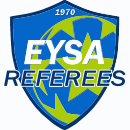
| Information | |
| Logon |
FAQ |
|
Direct Deposit
An important part of being a Referee is getting PAID. There are several components to getting paid, but perhaps the most important one is "Method of Payment". We now offer two methods: by Direct Deposit or by Check. Direct Deposit has a lot of advantages over Checks.
- Direct Deposit is quicker - you get the money in your account days earlier.
- Checks can get lost. If you lose a check, we must place a $35 Stop Payment on the check.
- If you wait too long, a check expires and your bank will charge you a $10 to $35 fee if you try to cash it after it expires. In addition, you'll need to contact us to get a new check issued.
- You don't have to spend the time to deposit a check.
We strongly recommend you set up Direct Deposit.
Direct Deposit
Direct Deposit is easy, secure, and takes us the same amount of time to pay 200 referees as it does 1 referee (by check).
- Easy - Direct Deposit is easy, as you choose your Bank from a drop down list, select the type of account (Checking or Savings), and enter your Account Number, check the Direct Deposit checkbox and you are setup.
- Secure - We use 128 bit SSL security (same as banks do) and frankly the data you give us is the same as if you write someone a check. Also we DO NOT have the ability to take money from your account, only deposit into it.
Direct Deposit is FREE to you for a Successful Direct Deposit - But [NOT] for an Unsuccessful Direct Deposit.
- If you enter incorrect information like the wrong Bank or Account Type (checking vs. savings) or Account Number and your bank rejects it they send this rejection to our bank and a $10 fee is imposed.
- If your bank determines that some information is incorrect, but is able to make the deposit, they send our bank a correction notice and the fee is $3.
Getting it right the first time: ALL banks offer the service (often online) to provide you with the 3 pieces of information we need for your Direct Deposit to be successful. Just ask them - and there will be NO Fees. You need:
- Name of the Bank
- Routing Number (the first 9 digit number on the bottom left of a blank check)
- Account Type (checking or saving)
- Account Number (the number on the bottom of the check just to the right of the Routing Number)
Your name must be on the account. It can't be your parent's account.
Caution
Sometimes banks change Account Numbers; Sometimes banks merge with other banks; etc., etc... Avoid these issues by paying attention to your banking.
Last Updated August 3, 2020
| Copyright © 2024 by Eastside Youth Soccer Association Referees/Webmaster@EYSAReferees.org |